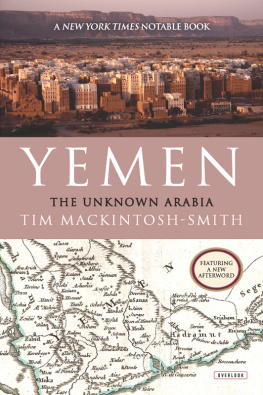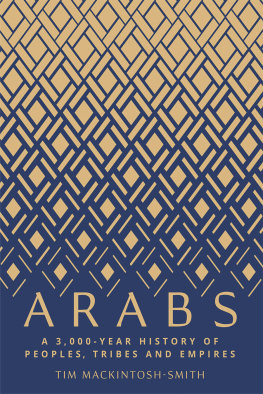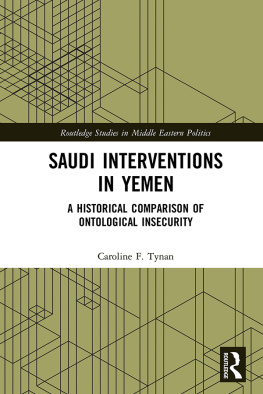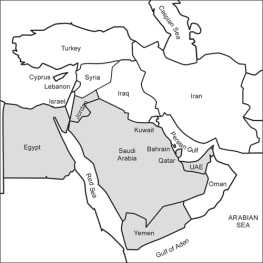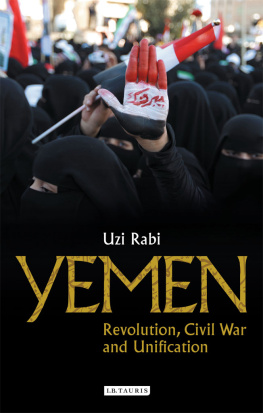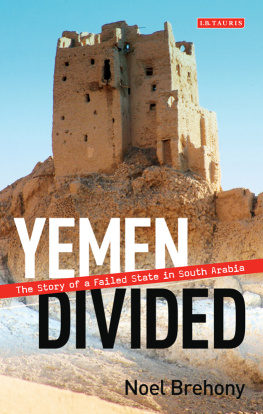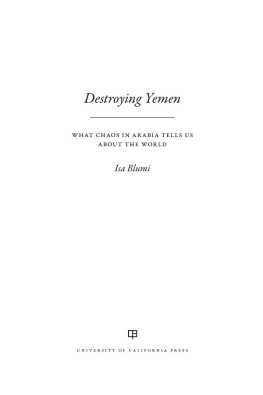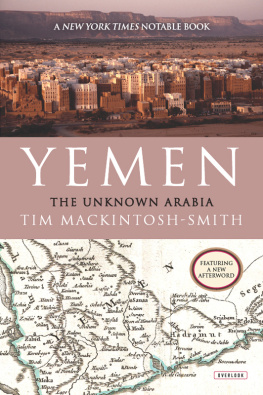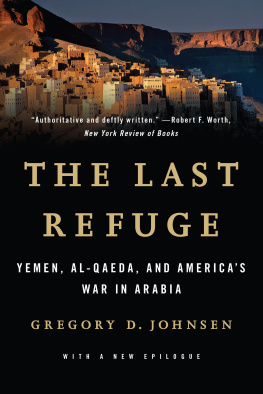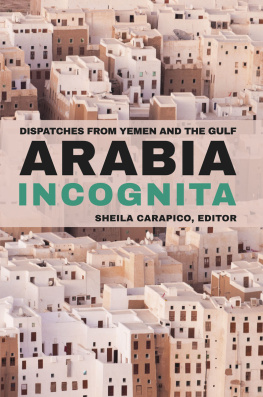YEMEN
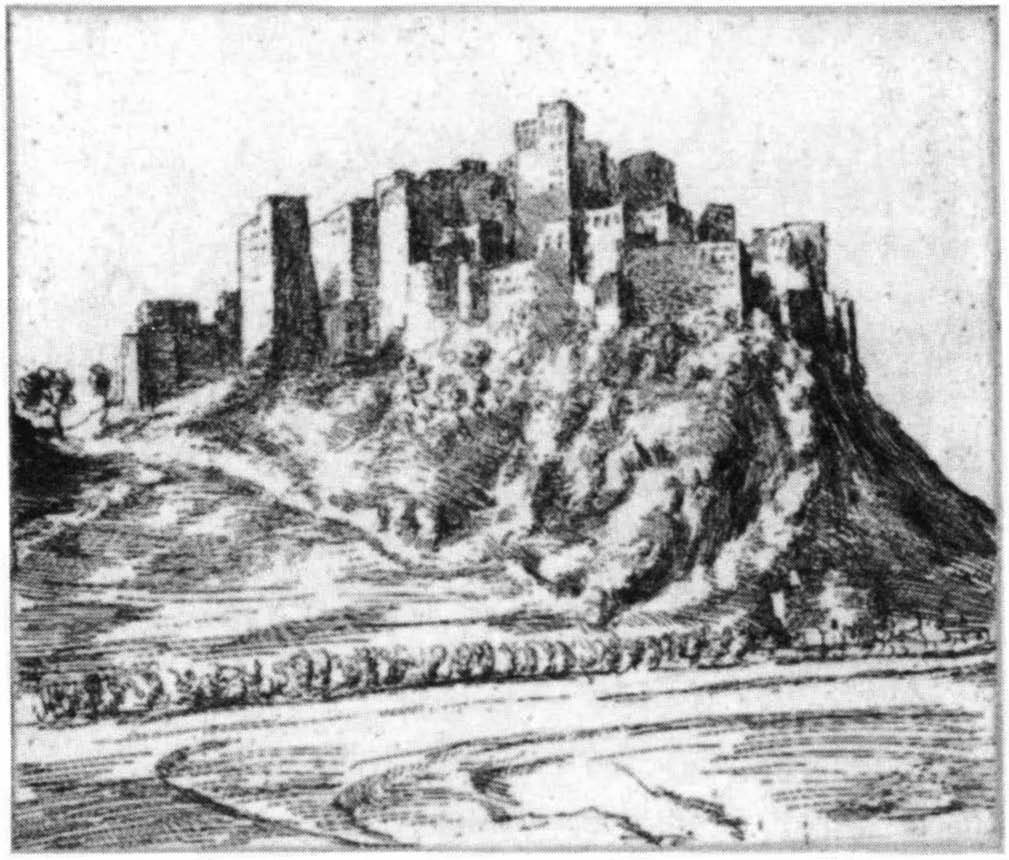
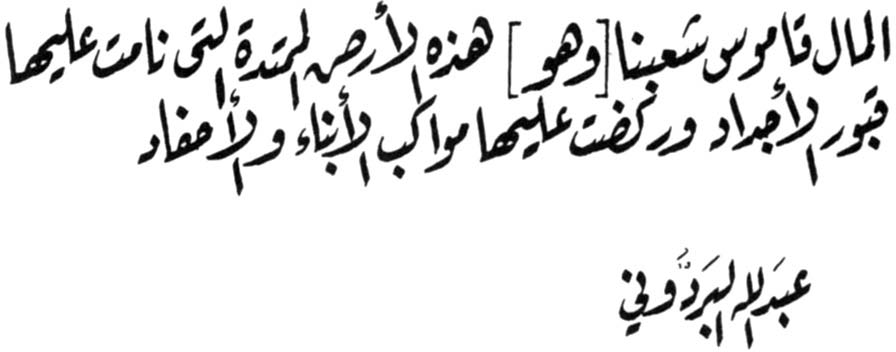
Our land is the dictionary of our people this land of far horizons where the graves of our ancestors sleep, this earth trodden by processions of sons and sons of sons.
Abdullah al-Baradduni, Funun al-adab al-shabi fi l-yaman , 1995
Ones ideas as to the nature of Arabia are entirely upset.
Walter Harris, A Journey through the Yemen , 1893
This edition first published in paperback in the United States in 2014 by
The Overlook Press, Peter Mayer Publishers, Inc.
141 Wooster Street
New York, NY 10012
www.overlookpress.com
For bulk and special sales please email , or write us at the above address.
Copyright 2000, 2014 by Tim Mackintosh-Smith
Illustrations copyright 2000 by Martin Yeoman
All rights reserved. No part of this publication may be
reproduced or transmitted in any form or by any means, electronic
or mechanical, including photocopy, recording, or any information
storage and retrieval system now known or to be invented, without
permission in writing from the publisher, except by a reviewer who
wishes to quote brief passages in connection with a review written for
inclusion in a magazine, newspaper, or broadcast.
Library of Congress Cataloging-in-Publication Data
Mackintosh-Smith, Tim.
Yemen: the unknown Arabia / Tim Mackintosh-Smith;
with etchings by Martin Yeoman.
p. cm.
Includes bibliographical references and index.
1. YemenDescription and travel. 2. Mackintosh-Smith, Tim
JourneysYemen. I. Yeoman, Martin. II. Title.
DS247.Y42 M295 2000 953.3dc21 99-059752
Manufactured in the United States of America
ISBN: 978-1-4683-0998-0
1 3 5 7 9 8 6 4 2
For my parents
and in memory of
Hajj Muhammad ibn Ali ibn Ali al-Sayrafi, of Sana
Contents
Al-Hajarah, Haraz
Abdulwahhab ibn Muhammad al-Sayrafi (drypoint)
Archway, carpenters suq , Sana
Sana, view from the authors house
Man cooking saltah
Qat chewer (drypoint)
Ali ibn Muhammad al-Sayrafi
Two kettles
Ruined nawbah above Wadi Dahr
Doorway in the village of Haz, Hamdan
Head of a camel
Portrait of a tribesman
Al-Hajarah in cloud
Dog resting
Figure studies
Hamud ibn Ahmad al-Qatta
Minaret, al-Ashrafiyyah Mosque, Taizz
Figure studies
Prospect among the coffee mountains above al-Hadiyah, Raymah
Abdullah al-Aqil (soft-ground etching)
Doorway
The Aden Tanks
Spice suq
Cake-seller (soft-ground etching)
Lime kiln, Wadi Hadramawt
A suburb of Tarim
Grand Red Sea house, al-Hudaydah
Stonecutters, al-Mukalla
Beached sambuqs
Dragons blood trees, Suqutra (after a photograph by the author)
Figure studies
The metal-workers suq at night, Sana
I should like to thank: Venetia Porter, Allestree Fisher and Peter Clark, for enabling me to come to Yemen in the first place; Edna OBrien, for telling me it was a crime to be in Yemen and not write about it; Jay Butler, for getting me started; Eric Hansen, who has encouraged me all along; all those who have commented on the text, especially Claudia Cooper, Debbie Dorman, Roger Hudson, Kevin Rushby, Hasan al-Shamahi and Iain Stevenson; John Cleaver, Mike Gowman, Muhammad Ali al-Hasani, Malcolm Johnson, Wendy Lee and Brendan MacSharry, for logistical support in one form or another; my agent, Carolyn Whitaker, for all her wisdom and enthusiasm; Gail Pirkis and Caroline Knox at John Murray, for indulging a book which is perhaps unfashionably digressive; Martin Yeoman, who has coped with dust, sun and melting etching plates to draw Yemen from the life as no one has before; all those who helped him come back Dr Abdullah Basodan, the British-Yemeni Society, Heather Bull, Stephen Day, J.N. Ellis, Alan Richards, and, in particular, Francine Stone; Ali Zayd al-Ashwal and the staff of Yemen Airways, for supporting Martin so generously, and for turning a blind eye to his excess baggage; and, of course, the countless Yemenis friends, acquaintances and strangers whose kindness and hospitality has often been overwhelming, in particular Abdulwahhab al-Sayrafi, Hasan al-Shamahi (again), Abdulsalam al-Amri, and their families. If this book conveys something of the gratitude, respect and affection I feel for them, and for the others I have not named, it will have achieved its purpose. The Prophet Muhammad said of the Yemenis: They have the kindest and gentlest hearts of all. Faith is Yemeni, wisdom is Yemeni. His words still hold true.
Bayt Qadi, Sana
April 1996
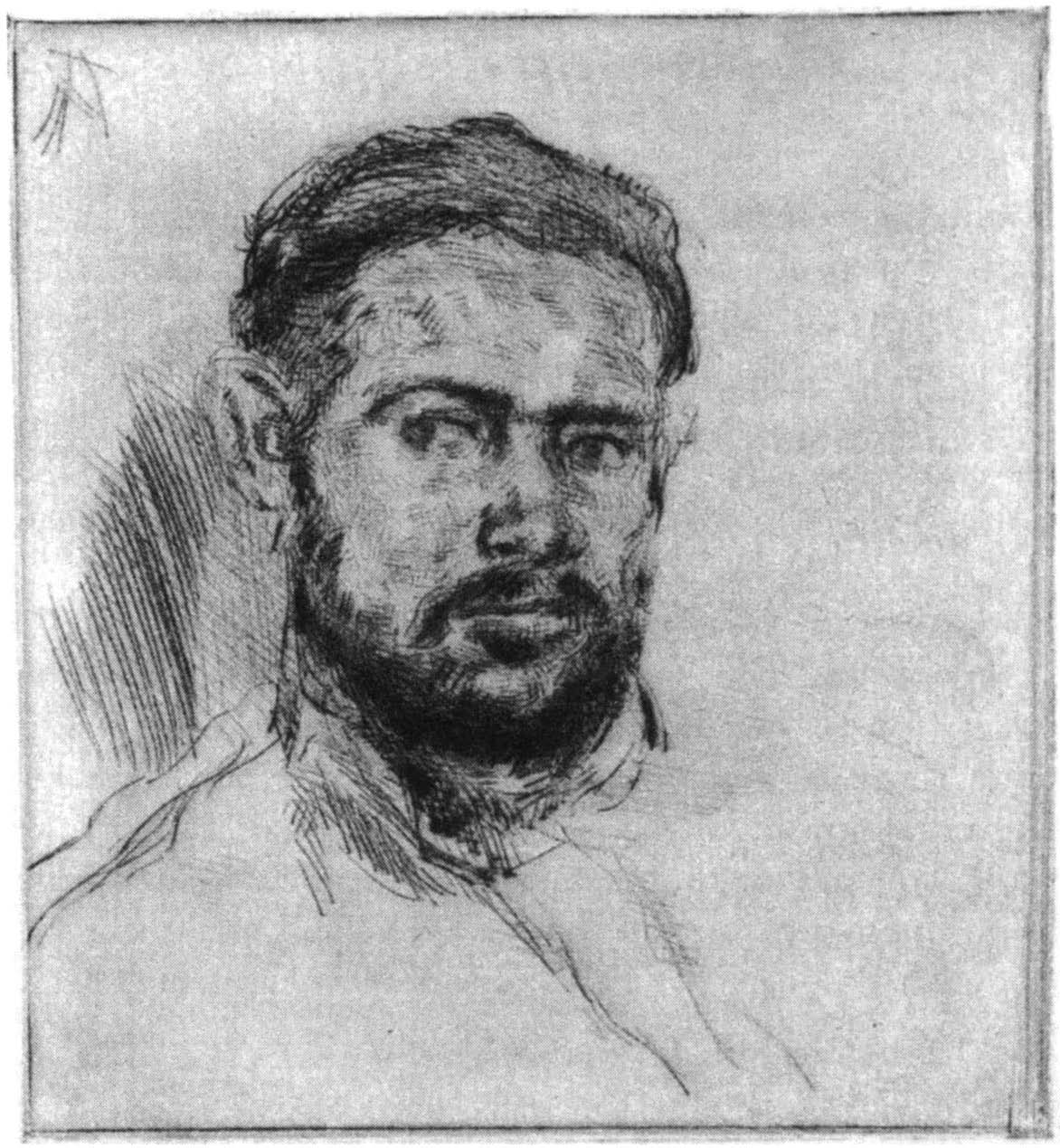
Y emeni history is at times bewilderingly complex. Although in I have tried to sketch in the general lines of pre-Islamic history, I have avoided doing so for later periods so as not to overload the reader with dates and dynasties. To compensate, the Glossary includes brief notes on some of the more important rulers of Yemen; also, the Bibliography is fuller than is usual in a book of this nature. It is a book which, I admit, treads the thin line between seriousness and frivolity. If at times it veers towards the latter as it does, for example, when I relate the more questionable anecdotes of the medieval traveller Ibn al-Mujawir I can only repeat his near contemporary Yaquts apologia concerning the edible monopod poets of Hadramawt: I have merely quoted from the books of learned men.
In transliterating Arabic words, I have followed the most commonly accepted system but minus the macrons and subscript dots; I have omitted initial ayns and hamzahs but have retained final ayns ; the two letters are not distinguished when they occur within a word. A few readers may find this annoying, but it makes for clearer typography. Thus, the capital city of Yemen, an (otherwise Sana, Sanaa and Sanaa), appears in this book as Sana. As for my rendering of Suqutri words, I apologize in advance to the half dozen or so scholars of that language for any deficiencies they may find.
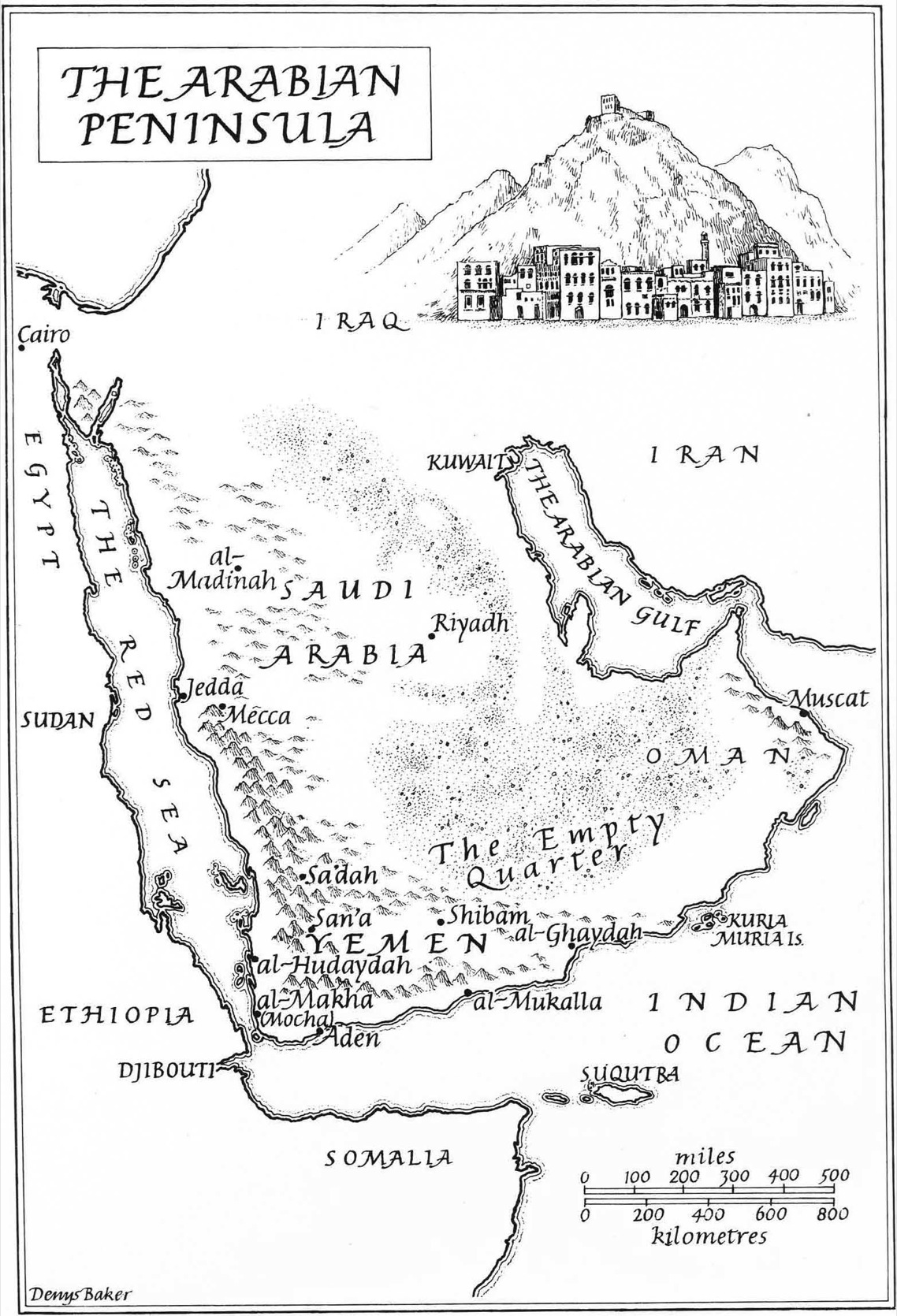
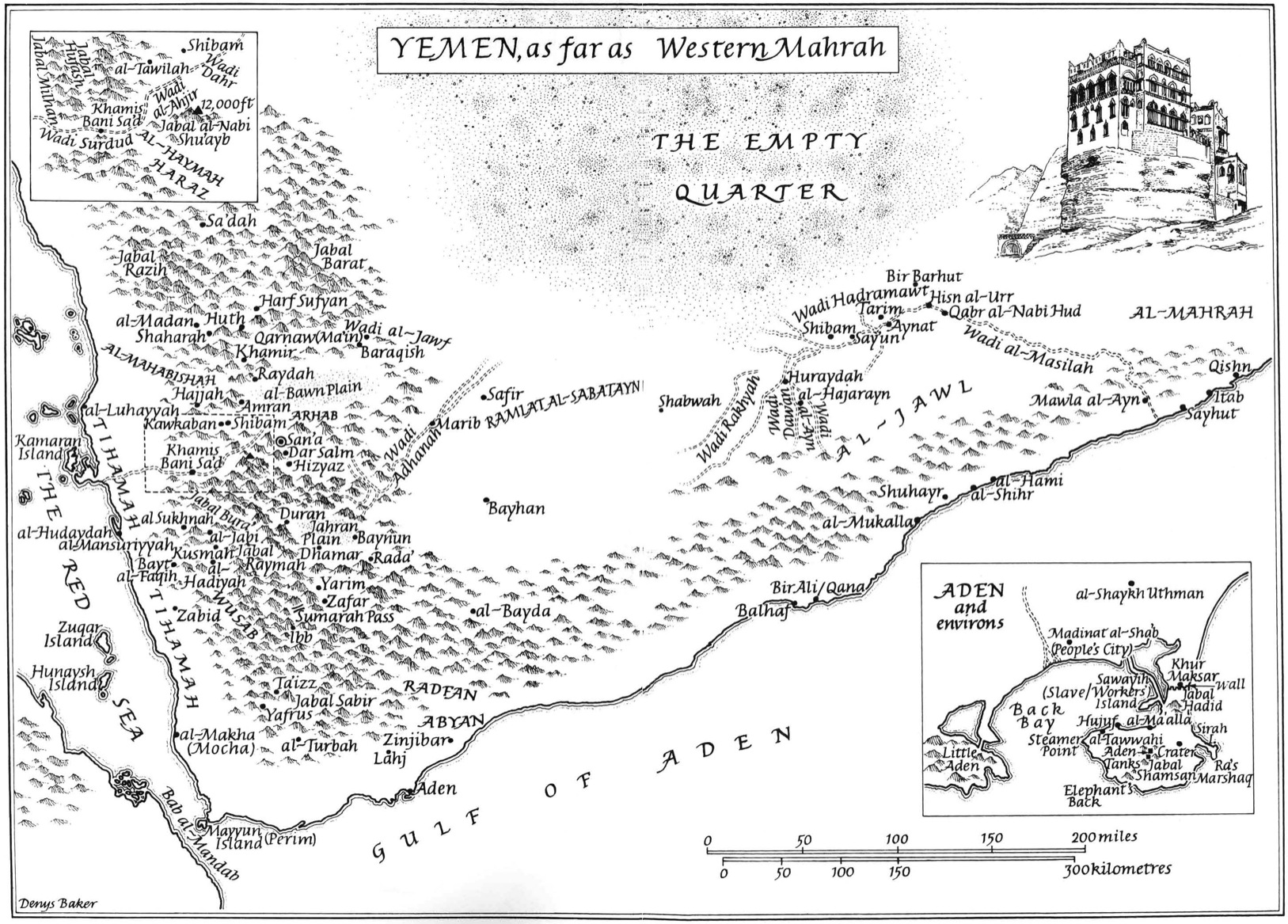
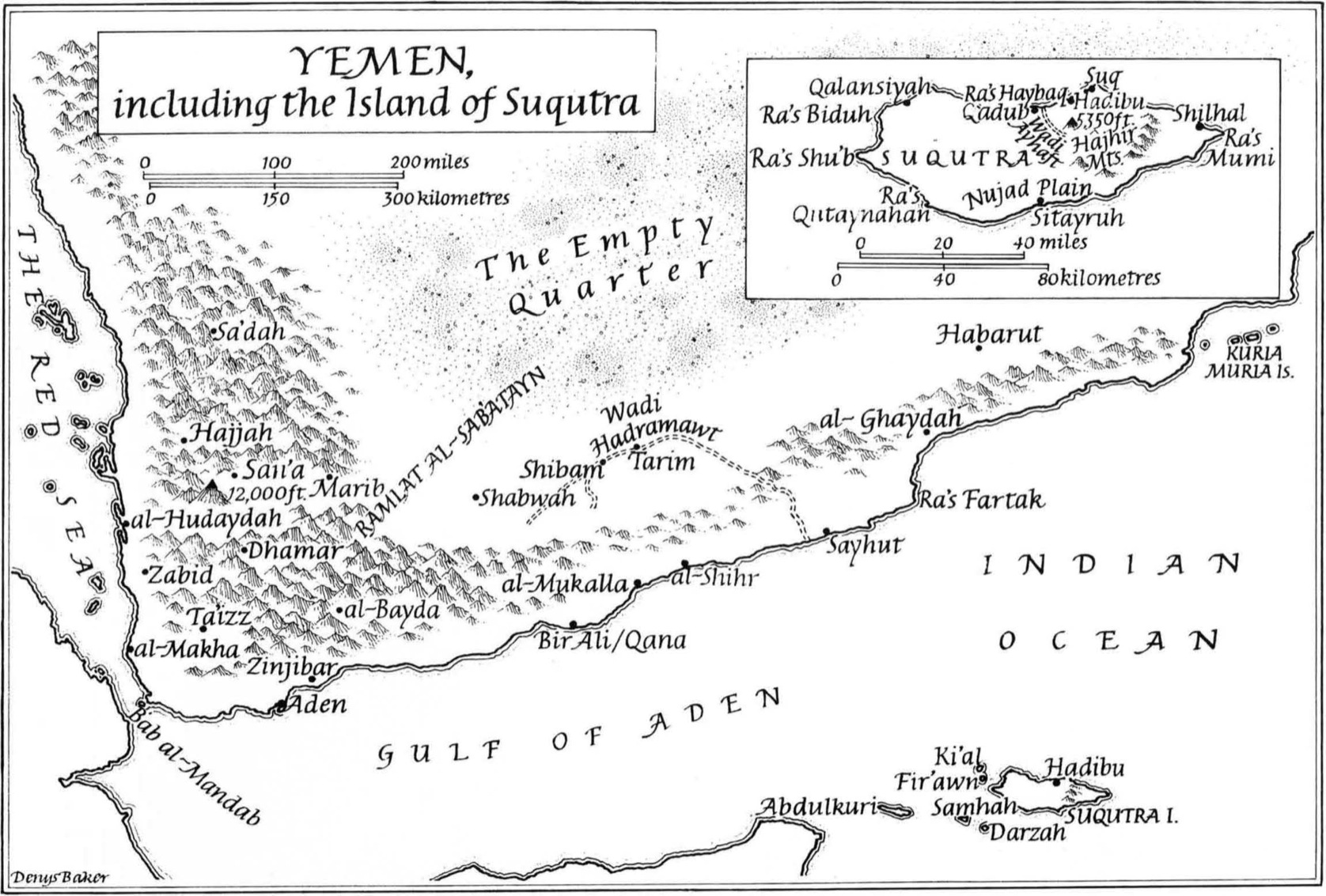
A definition is the enclosing of a wilderness of idea within a wall of words.
Samuel Butler, Notebooks
T HE RAIN BEAT DOWN . Horns rasped against the door: a sheep trying to get in. I didnt blame it spring was late in the Isle of Harris and it was cosy inside, all peat smoke and roll-ups. An easterly gale was whistling across the Sound from Skye and flinging sackfuls of hail at the tin roof of the croft house. The noise was deafening.
You have to be somewhere quiet like Harris in the early stages of learning Arabic, somewhere you can walk around unheard, muttering strange, strangulated syllables, limbering up minute and never-used muscles of tongue and glottis. I got up to make tea. Hhha! I said to the matches when I found them; Ghghgha! when they refused to light. I mouthed to the hooded crow on the fence outside the window; that innocent-looking sign represented the trickiest letter of all, a guttural stop pronounced with constriction of the larynx, my grammar said. The hoodie croaked back and flapped off to peck out lambs eyes.

